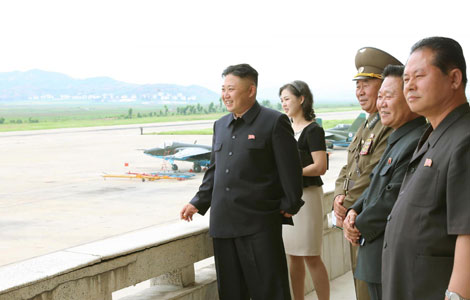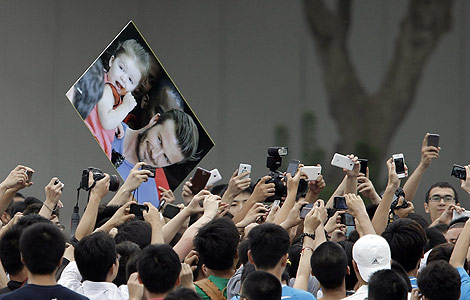Snowden has exposed the obvious
Updated: 2013-06-21 07:05
By Op Rana (China Daily)
|
||||||||

The world we live in today is so different from what it was 40 years ago that the Watergate scandal seems like remote history. Yet here we are face to face with another surveillance and espionage drama - yes, that is exactly what former CIA agent and US National Security Agency operative Edward Snowden's expose is. It's a drama with a difference, though, because it is being played out on - and by - the media.
Perhaps - and contrary to the common perception - the NSA's surveillance program is (is, because it has not been terminated) aimed at getting a stranglehold on people and organizations not only to strengthen the US government's hands. It is also aimed at helping US corporations consolidate their hold on the global markets and thus make more profits.
Let's get the facts from the other side, the United States, first. Snowden initially violated his oath to safeguard the US national security secrets entrusted to him by revealing NSA programs, which could affect the "privacy of US citizens". This is what a Western newspaper says.
By claiming that hundreds of the more than 61,000 NSA global hacking operations were directed at the Chinese mainland and Hong Kong, Snowden has given Beijing the moral upper ground in cyber-warfare, says the newspaper. The drama, as it turns out, is all about the privacy of American citizens, which the US administration has been violating anyway since Sept 11, 2001, and China.
Well, every other thing that happens in the US has to do with China - be it the cheap Chinese goods the Americans have been enjoying for the past couple of decades, the jobs they wrongly assume to have lost to Chinese workers or the trade imbalance that the US claims is the result of China's "skewed" currency policy.
That he chose Hong Kong to reveal the dirty secrets of the NSA has been used by some to also allege that Snowden is a spy in the employ of China. People even remotely familiar with espionage would see the absurdity of such an allegation, because that is not how countries run their spy networks.
If we return to the early days of George W. Bush's presidency, we will see secretary of defense Donald Rumsfeld declaring war on the "Pentagon bureaucracy". Addressing his staff a day before Sept 11, Rumsfeld said, the "adversary that poses a threat, a serious threat, to the security of the United States of America is one of the last bastions of central planning It governs by dictating five-year plans. It disrupts the defense of the United States and places the lives of the men and women in uniform at risk perhaps the adversary sounds like the former Soviet Union, but The adversary's closer to home: It's the Pentagon bureaucracy."
The Sept 11 attack gave Bush and Rumsfeld the opportunity to dismantle the "Pentagon bureaucracy" and privatize the "core" of US functions, from "the military, police, fire departments, prisons, border control, (and) covert intelligence", to "disease control, the public school system and the governing of government bureaucracies", writes Naomi Klein in her Shock Doctrine. The privatization spree of the 1980s and 1990s (of publicly owned companies) had been so profitable for private companies that they were "greedily eyeing these essential functions as the next source of instant riches". And instant riches they made. For proof, check the balance sheets of Halliburton, Blackwater and other such companies.
And when covert intelligence is privatized, the major function it serves is to enable private companies to make more profits. It is in this context that the NSA's surveillance program should be seen.
Of course, the NSA's program is a violation of Americans' constitutional rights, as former US vice-president Al Gore has said. Of course, it violates the "privacy of US citizens", which the Western media have been focusing on so ardently. But it is also a blatant violation of the democratic rights and privacy of people (and enterprises) in others countries.
Surprisingly, the US (and other Western) media have been highlighting aspects of the Snowden case that have nothing to do with the expose. They have been running stories and commentaries on subjects such as whether Snowden can be extradited to the US and what his thoughts were as a 17-year-old. In fact, Snowden said as much to The Guardian on Monday: "Unfortunately, the mainstream media now seems far more interested in what I said when I was 17 or what my girlfriend looks like rather than, say, the largest program of suspicionless surveillance in human history."
As for the first fact from the other side, whether Snowden caused damage to national security, let's hear what three former NSA employees have to say. Praising Snowden's expose in an interview with USA Today, Thomas Drake, William Binney and J. Kirk Wiebe said his disclosures did not cause grave damage to national security and what he has discovered is "material evidence of an institutional crime".
China fits in perfectly in this "material evidence of an institutional crime" because it is the only country that poses a challenge to the US both on the economic and strategic front (Russia is not yet an economic challenge).
So if former president Richard Nixon was using tape-recorded conversations to consolidate his power in the 1970s, the US administration today spies on e-mails and phone calls to not only strengthen its strategic arm, but also help American companies make more money. But this should not come as a surprise to those familiar with the way US functions under both Democratic and Republican administrations.
The author is a senior editor with China Daily.
Email: oprana@hotmail.com.
(China Daily USA 06/21/2013 page16)
Most Viewed
Editor's Picks

|

|

|

|

|

|
Today's Top News
China slams US human trafficking report
China urges resumption of six-party talks
SEC charges China-based firm with fraud
Bank of China denies monetary default report
Snowden's future hangs in balance
China reiterates support for the UN
Dairy measures start at source
June PMI signals weakness
US Weekly

|

|















